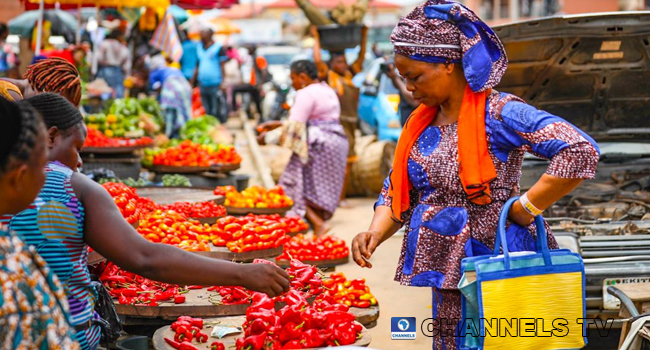By Jeph Ajobaju, Chief Copy Editor
February marked a four-year peak of inflation in Nigeria, cresting on 20 per cent hike in food prices that piled on financial pressure on households buffeted by joblessness and insecurity in an economy lacking growth.
Latest figures churned out by the National Bureau of Statistics (NBS) showed that inflation, in double digits since 2016, reached 17.33 per cent in February 2021.
Partly to blame is the impact of coronavirus that also induced a drop in the price of oil, Nigeria’s main export, and weakened the naira.
Background to rising food prices
Food prices began to rise in April at the onset of coronavirus lockdown when traders complained that policemen demanded bribe from foodstuff truck drivers, although the government exempted such vehicles from restrictions on movement.
Traders said policemen collected bribe from them at checkpoints, and they had to pass the additional cost to consumers.
By April 2020, a 50kg bag of garri, cassava flour – the cheapest and commonest poor man’s food across Nigeria, North and South – doubled in price from N6,000 to N12,000.
“A 50kg bag of Nigerian rice that we used to buy for between N14,000 and N15,000 now costs N21,000,” Peter Ogaa, a trader, told TheNiche at the time.
“The price of a 50kg bag of imported rice has risen from N22,000 to N28,000. A 50kg bag of beans now costs N14,700 instead of N8,500.”
Food prices have been increasing ever since.
And they are compounded by incremental rises in the pump price of fuel, which transporters pass on to food vendors in high fares that percolate down the chain to the wallet of consumers.
Stagflation fears
Reuters reports the latest inflation reading is the highest since the 17.78 per cent touched in February 2017. The economy was in a slump then, and is teetering on the brink of recession now, having expanded just 0.11 per cent in the fourth quarter.
Food prices, which make up the bulk of the inflation basket, rose 21.79 per cent in February, a jump of 1.22 percentage point on January, the NBS said in its report.
Reuters adds that in a country plagued by insecurity following a wave of kidnappings of schoolchildren in the lawless North, there are concerns that the “stagflation” combination of rising unemployment and prices and low growth could trigger significant social unrest.
“Straining households will be compounded by increasing reports of insecurity in some regions, fuelling the risk of broader social discontent,” said Jacques Nel, head of macroeconomic research at NKC African economics in South Africa.
Staples including bread, cereals, potatoes, fruits and oil drove the increase in the food price index, the NBS said.
Inflation pressures would probably remain high in coming months, Nel predicted, adding that just 30.6 million Nigerians of a population of around 210 million were considered fully employed.
Bismark Rewane, managing director at Financial Derivatives based in Lagos, said the “stagflation crisis” would take a long time to resolve, with inflation eating up economic gains to the point where any government stimulus might be too weak to generate jobs.
Monetary policy dilemma
President Muhammadu Buhari has made investment in rail and road a focus of his administration’s drive to kick-start growth, but falls in public revenue linked to the lower oil price have checked his ambitions.
Given the low-growth and high-inflation backdrop, few analysts expect the Central Bank of Nigeria (CBN) to either raise or lower its base rate of 11.5 per cent on March 23, when it holds a policy meeting.
“They should be thinking of tightening to encourage savings and investment which could help employment but I think we may have reached the limit of (what can be achieved with changes to) monetary policy,” Rewane said.
The International Monetary Fund (IMF), which said in February the CBN might need to tighten policy if inflation got out of control, has urged it to phase out financing of the government deficit to help check price pressures, and to allow the naira to float more freely.
The CBN has tried to manage pressure on the currency by restricting access to dollars for certain imports to boost local production, and set up a multiple currency rates.
Such “subsidised credit” had clearly failed to prevent a rise in near-term inflation, said Razia Khan, chief economist for Africa and the Middle East at Standard Chartered.














